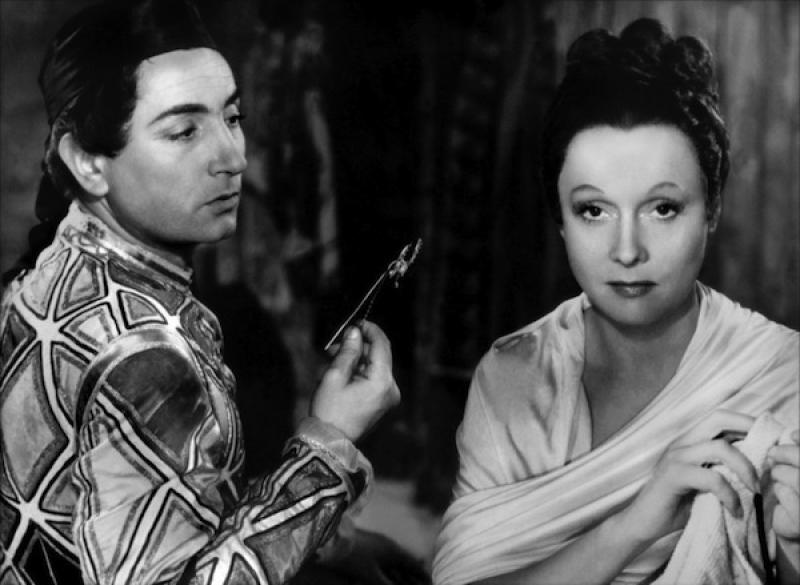DVD: Les Enfants du paradis | reviews, news & interviews
DVD: Les Enfants du paradis
DVD: Les Enfants du paradis
Marcel Carné's newly restored classic about four men pursuing an elusive beauty in the 1820s Paris theatre world

Begun in 1943 and released in 1945, Les Enfants du paradis, which unfolds in two acts – the first frantic, the second slow – in Paris’s theatre quarter in the 1820s and ’30s, is regarded as the crowning glory of director Marcel Carné and screenwriter Jacques Prévert’s fertile partnership.
It has traditionally topped French polls of the country’s greatest films, but it cannot be said to match Jean Renoir’s La Grande illusion and La Règle de jeu or Jean Vigo’s L’Atalante for the depth of their humanism. Le Quai des brumes and Le Jour se lève, Carné and Prévert’s gloomy, existential poetic realist dramas starring Jean Gabin, meanwhile emphasise Les Enfants’ baroque gaudiness.

The three main male characters were based on real celebrities. A shy mime played by the exquisite Jean-Louis Barrault (pictured right), a flamboyant actor (Pierre Brasseur) and a misanthropic criminal-playwright (Marcel Herrand) are in love with Garance (Arletty), a courtesan with a Mona Lisa smile who owes something to Marlene Dietrich in her Josef von Sternberg films.
She is also coveted by a count who operates on the principle that everyone can be bought; an avatar of truth, she sells him only her body and companionship, not her loyalty. She loves the mime – who doesn’t know – as does an actress (Maria Casarès). Only two of the six have a shot at happiness. Given the constant references to the role of fate, that’s two too many.
As a celebratory backstage comedy that grows into a melancholy disquisition on the impossibility of romantic love, Carné’s film remains timeless. It also succeeds as an allegory of life as theatrical melodrama and as an allegory of the Occupation (Garance symboliaes non-Vichy France, the count the Nazis, Pierre Renoir’s rag collector-cum-snitch the collaborationists). That it didn’t make the list of top 10 greatest French films culled from the recent Sight and Sound poll doesn’t invalidate it as an illustrious classic.
rating
Explore topics
Share this article
The future of Arts Journalism
You can stop theartsdesk.com closing!
We urgently need financing to survive. Our fundraising drive has thus far raised £49,000 but we need to reach £100,000 or we will be forced to close. Please contribute here: https://gofund.me/c3f6033d
And if you can forward this information to anyone who might assist, we’d be grateful.

Subscribe to theartsdesk.com
Thank you for continuing to read our work on theartsdesk.com. For unlimited access to every article in its entirety, including our archive of more than 15,000 pieces, we're asking for £5 per month or £40 per year. We feel it's a very good deal, and hope you do too.
To take a subscription now simply click here.
And if you're looking for that extra gift for a friend or family member, why not treat them to a theartsdesk.com gift subscription?
more Film
 Little Trouble Girls review - masterful debut breathes new life into a girl's sexual awakening
Urska Dukic's study of a confused Catholic teenager is exquisitely realised
Little Trouble Girls review - masterful debut breathes new life into a girl's sexual awakening
Urska Dukic's study of a confused Catholic teenager is exquisitely realised
 Young Mothers review - the Dardennes explore teenage motherhood in compelling drama
Life after birth: five young mothers in Liège struggle to provide for their babies
Young Mothers review - the Dardennes explore teenage motherhood in compelling drama
Life after birth: five young mothers in Liège struggle to provide for their babies
 Blu-ray: Finis Terrae
Bleak but compelling semi-documentary, filmed on location in Brittany
Blu-ray: Finis Terrae
Bleak but compelling semi-documentary, filmed on location in Brittany
 Oslo Stories Trilogy: Sex review - sexual identity slips, hurts and heals
A quietly visionary series concludes with two chimney sweeps' awkward sexual liberation
Oslo Stories Trilogy: Sex review - sexual identity slips, hurts and heals
A quietly visionary series concludes with two chimney sweeps' awkward sexual liberation
 Sorry, Baby review - the healing power of friendship in the aftermath of sexual assault
Eva Victor writes, directs and stars in their endearing debut feature
Sorry, Baby review - the healing power of friendship in the aftermath of sexual assault
Eva Victor writes, directs and stars in their endearing debut feature
 Blu-ray: Who Wants to Kill Jessie?
Fast-paced and visually inventive Czech comedy
Blu-ray: Who Wants to Kill Jessie?
Fast-paced and visually inventive Czech comedy
 Oslo Stories Trilogy: Love review - freed love
Gay cruising offers straight female lessons in a heady ode to urban connection
Oslo Stories Trilogy: Love review - freed love
Gay cruising offers straight female lessons in a heady ode to urban connection
 Beating Hearts review - kiss kiss, slam slam
Romance and clobberings in a so-so French melodrama
Beating Hearts review - kiss kiss, slam slam
Romance and clobberings in a so-so French melodrama
 Materialists review - a misfiring romcom or an undercooked satire?
Writer-director Celine Song's latest can't decide what kind of film it is
Materialists review - a misfiring romcom or an undercooked satire?
Writer-director Celine Song's latest can't decide what kind of film it is
 theartsdesk Q&A: actor Leonie Benesch on playing an overburdened nurse in the Swiss drama 'Late Shift'
The Guildhall-trained German star talks about the enormous pressures placed on nurses and her admiration for British films and TV
theartsdesk Q&A: actor Leonie Benesch on playing an overburdened nurse in the Swiss drama 'Late Shift'
The Guildhall-trained German star talks about the enormous pressures placed on nurses and her admiration for British films and TV
 Freakier Friday review - body-swapping gone ballistic
Lindsay Lohan and Jamie Lee Curtis's comedy sequel jumbles up more than their daughter-mother duo
Freakier Friday review - body-swapping gone ballistic
Lindsay Lohan and Jamie Lee Curtis's comedy sequel jumbles up more than their daughter-mother duo

Add comment